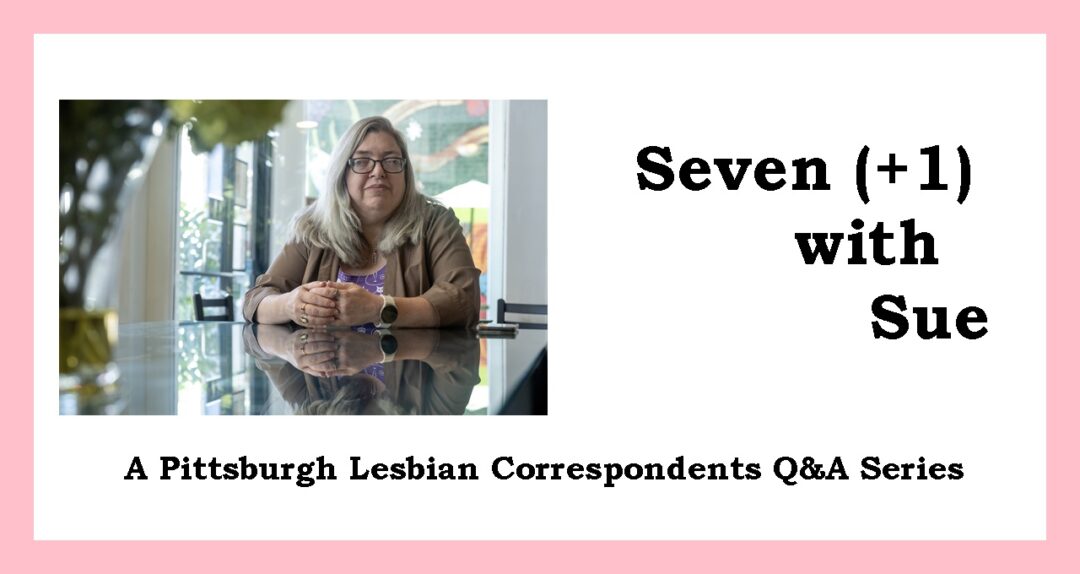
For the summer arts and culture season, we’ve revived ‘Seven With Sue’ – a sort of quick Q&A with seven questions (and a plus one!) To kick off this new-ish series, we are talking this week with creators involved with Madame Clicquot opening on Thursday. Pittsburgh CLO is proud to present this exclusive world premiere at the Byham Theater before its journey to Broadway and the West End.
Set against the backdrop of the French Revolution and Napoleonic Wars, MADAME CLICQUOT: A Revolutionary Musical tells the remarkable true story of a young woman who defied societal expectations to become one of the most powerful forces in the history of champagne. In 1789, Barbe-Nicole Ponsardin flees her boarding school as revolution engulfs France. A decade later, an arranged marriage to François Clicquot, the son of her father’s business rival, unexpectedly leads to an innovative partnership in winemaking. But when tragedy strikes, she faces an impossible choice – surrender to fate or risk everything to change the industry forever. With innovation, resilience, and a bold gamble that could make or break her legacy, she takes on the male-dominated world of Champagne, transforming the industry and securing her place in history.

I posted the cast album below so you can enjoy the songs. Pittsburgh has such a vibrant cultural scene. I’m always pleased to see feminist productions and this tale looks pretty cool.
Stay tuned for a Q&A with the writer and the costume designer.
Your Name: Laurie Glodowski
Pronouns: (She/Her)
Your Affiliation with the Production: Lead Producer, Director/Choreographer
1. Tell us about your connection to Pittsburgh.
I was born in Pittsburgh, a city deeply woven into my family’s legacy. My grandparents, Dorothy and Herbert Finkelhor, founded Point Park College as a business school, and together with my father, Arthur Blum, helped transform it into a four-year liberal arts college. My father went on to serve as its president and played a pivotal role in shaping the city’s cultural landscape—he was instrumental in the establishment of Pittsburgh Ballet Theatre and a devoted champion of the Pittsburgh Symphony, the Wind Symphony, and arts education throughout the region. My mother, Joanne Blum, served as the Dean of Education at Point Park and created influential schools that continue to be remembered and admired today. My sisters and I grew up dancing at Point Park and performed as children at Heinz Hall. My husband, Justin Glodowski, and his brother Greg also danced with the Pittsburgh Ballet Theater. Early on, Justin was a student at Point Park’s performing arts high school, a program my parents established. We grew up in Mount Lebanon and spent our childhoods running through the halls of Heinz Hall and the original Pittsburgh Playhouse. Several years ago, my father was awarded an honorary doctorate from Point Park University, and our family was given a tour of the stunning new Playhouse—a space he had dreamed of and planned for more than fifty years earlier.
2. How does your work on this production change the way you look at the world?
Working on MADAME CLICQUOT: A REVOLUTIONARY MUSICAL as its director and choreographer has deepened—and in many ways affirmed—my belief in the power of perseverance, equality, and the universal human experience. Immersing myself in the beautiful words and deeply human characters crafted by Lisette and Richie has been transformative. Their writing doesn’t just evoke a bygone era; it captures something timeless—how we confront adversity, how we stumble, and how we find the strength to rise again. The show spans the tumultuous backdrop of the Napoleonic Wars, yet the emotional truth of Barbe-Nicole’s journey—marked by failure, loss, and tenacity—feels strikingly contemporary. While the writers have taken a few artistic liberties to shape the musical, their commitment to historical accuracy grounds the story in a powerful authenticity. As I’ve lived inside this material, I’ve found myself quoting lines from the script in everyday conversation. More than once, someone has said to me, “Oh—I get it. You are Barbe-Nicole.” And while that resonates, I also know she lives in so many of us. These characters have been written with such care and accessibility that audiences can’t help but see themselves reflected on stage. It’s a story that connects us—to history, to resilience, and most of all, to each other.
3. Tell us about an under-appreciated or underutilized cultural resource in this region.
Children are one of our most underutilized cultural resources. Too often, we underestimate their capacity for insight, creativity, and connection. But when we teach them—when we show them the beauty of art alongside the elegance of mathematics—we open their minds to a world where the arts and sciences coexist, inform, and elevate one another. We need to help children see that the arts are not an extracurricular luxury, but a vital part of a thriving, intellectual, and emotional life. By inviting them to participate in the arts—not just as performers, but as designers, technicians, composers, writers, directors—we give them a chance to see themselves in roles they may never have imagined. We must fund their programs, mentor their talents, and show them how the arts connect to every part of life: teamwork in sports, problem-solving in math, and storytelling in their own families and communities.
We need to take children seriously as thinkers, as creators, and as future cultural citizens. Create avenues for them to become anything, including curious, compassionate, and engaged audience members—at the theater, the ballet, the symphony, a football game, a tennis match, or a town hall. Show them that their full selves matter, that they have something to say, and that the arts can help them say it. This is not optional. This is essential. Because when we equip children to understand and participate in the arts, we’re not just building artists—we’re building a stronger, more expressive, more empathetic society.
4. With whom in the Pittsburgh region would you like to collaborate?
I will happily collaborate with anyone!
5. How do the arts contribute to a livable city?
The arts are vital to creating a livable city. They invite curiosity, foster empathy, and build bridges between communities. A thriving arts scene energizes neighborhoods, draws people into shared spaces, and generates cultural and economic vibrancy. Whether it’s a child discovering their voice in a local theater program or a visitor experiencing a new perspective through a performance, the arts shape how we see ourselves and each other. They challenge, inspire, and unite—and in doing so, they make our cities more dynamic, more inclusive, and ultimately, more livable.
6. Why does musical theater in general and this show in particular have such widespread appeal?
There’s something uniquely powerful about music and movement that speaks to us on a deeper emotional level—beyond logic, beyond language. A melody can hold hope, heartbreak, or triumph in a single phrase; choreography can express what words alone cannot. Musical theater allows us to feel history in our bones, to breathe alongside characters as they fight, fall, and rise. It invites audiences to witness not just a story, but an emotional journey—one that’s immersive, communal, and cathartic. That’s why it endures, and why it matters. In a world where we are so often disconnected, musical theater reminds us what it means to be human—together.
7. Please list two or three local creators to whom we should be paying attention and tell us why?
Not sure how to answer this, exactly, other than to say that the students coming out of Point Park, Carnegie Mellon, University of Pittsburgh, and so many other prestigious arts programs in the area, are absolutely the “ones to watch”. The arts education is so very good in the area. These students are being well prepared and we should pay attention! Broadway sure does – Broadway, Off Broadway, and West End productions almost always have a cast member (if not several) who proudly list their affiliation to Pittsburgh!
Plus One: How does collaborating with your family enhance this role?
For me, there’s also a personal joy in working alongside members of my own family on Madame Clicquot. We’ve been creating theater together for as long as I can remember. We are professionals—we each bring our own expertise and focus to the work—but we also bring a deep well of trust and shared history. We support each other, always. It’s a rare and beautiful thing to collaborate with the people you love. And that sense of family extends beyond my actual family to include the cast, creative team, production team, crew, and all the support structures it takes to bring a show like this to life. Through the process of creating art on stage, we eventually become one big family—but I guess I just start with a stacked deck.
Madame Clicquot is at the Byham May 29 – June 8.Call 412-456-6666 or visit PittsburghCLO.org





